 07/09/2004 12:05 07/09/2004 12:05 |
|
| | | Post: 38 | Registrato il: 03/09/2004
| Utente Junior | | OFFLINE | |
|
Helen Williams era lì - Iraq Diaries da electroniciraq.net Penserete che si tratta di un doppione, ma non è così. Purtroppo la pagina in cui sono stati inseriti gli articoli ha avuto un problema di script, e quindi non si può postare agevolmente. Sto riversando tutto qui, di seguito.
http://electroniciraq.net/[Modificato da cercatore01 07/09/2004 12.06] cercatore - amministratore del forum |
|
 07/09/2004 12:09 07/09/2004 12:09 |
|
Marco Massarotto
[Non Registrato] | |
|
All'indirizzo
http://electroniciraq.net/news/1615.shtml
sino a ieri c'era l'articolo di helen sulal missione a najaf del 19 agosto. Da ieri non è più rintracciabile. Nell'articolo anche le foto del copnvoglio nella moscheda di Kufa, di un misterioso personaggio che "ci ha filmati tutti, tutto il giorno".
Helen è irrintracciabile, l'articolo pure, solo per la cronaca.
Marco Massarotto
marco@marcomassarotto.com |
 07/09/2004 12:19 07/09/2004 12:19 |
|
| | | Post: 39 | Registrato il: 03/09/2004
| Utente Junior | | OFFLINE | |
|
Iraq Diaries - l'articolo di cui parlavi è qui sotto, completo di foto, in 3 parti Alcuni di voi noteranno che ho eliminato l'articolo di electroniciraq.net in versione testuale: questo solo perchè sono riuscito a ricostruire la versione originale, completa di foto.
penso di non fare torto a nessuno, pubblicandolo. se ci fossero dubbi, scrivete a: inchiesta@hotmail.com
ps: l'articolo è stato ricostruito grazie al lavoro id alcuni utenti che avevano scaricato il blog di Baldoni alcuni giorni prima della scomparsa dell'articolo di electroniciraq.net, e quindi tutte le foto in esso contenute (dato che Bloghdad linkava a quell'articolo).cercatore - amministratore del forum |
 07/09/2004 12:58 07/09/2004 12:58 |
|
| | | Post: 40 | Registrato il: 03/09/2004
| Utente Junior | | OFFLINE | |
|
<style type="text/css"></style> Iraq Diaries [parte 1]
Helen Williams, Electronic Iraq, 23 August 2004
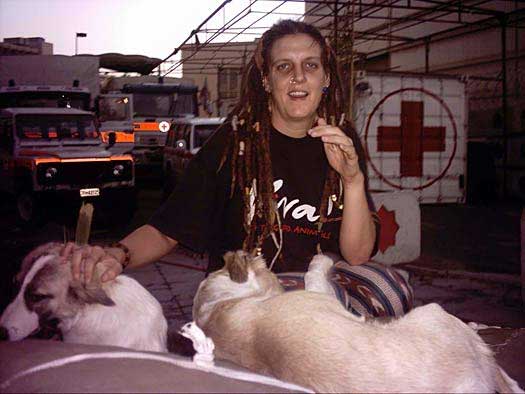 | | Helen getting ready to go at the Italian Red Cross Hospital, Medical City, Baghdad. |
Baghdad, 21 August 2004 -- On Thursday morning, my translator, Wejdy, and I set off, with our friend, Ali, at 5.30pm for the Italian Red Cross Hospital in Medical City in Baghdad. The streets were silent and empty as we sped across Baghdad - thankfully there were no traffic jams at this hour of the morning. From there we set off for Najaf. There were around 15 Italian Red Cross volunteers with some Iraqi Red Cross staff and we were to travel in convoy on the long and possibly dangerous journey to Najaf, taking much needed medical supplies and a lorry load of litre bags of water.
Ali, in his car headed up the convoy, which contained two 4-wheel drives full of volunteers, two Red Cross lorries (one with medical supplies, the other with the water), one ambulance (also containing medical equipment) and another car of volunteers. Wejdy and I traveled in the back of the ambulance, quite comfortably amongst all the boxes and equipment. We sat next to the sliding side door, the window of which slid open from both sides. I sat on a seat facing forward and Wejdy sat in front of me, with his back to the driver's cabin, so we slid the window open a little from both sides so that we could both see out.
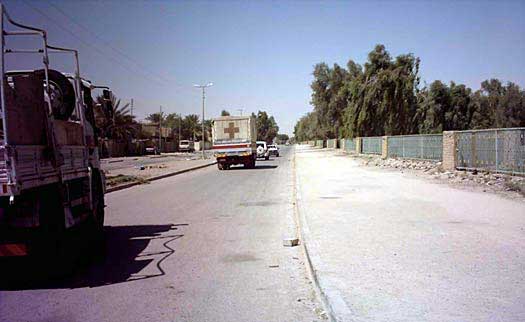 | | The Red Cross convoy moving throught the deserted streets of Najaf. |
If we had not opened the window we could not see out as the window was covered in a sticky plastic frosted glass covering. After several stops and delays driving through Baghdad, we left the city and headed south. Wejdy and I were quite happy sitting in the back of the ambulance and ate some food and drank some water as we passed Mahmoudiya and approached Hilla. We passed through Al Lattifya, 20 kilometers from Mahmoudiya and 50 kilometers from Baghdad.
All of a sudden, there was a huge explosion. The impact of which seemed to burst against the side of the ambulance and the glass in the window shattered. I did not know what it was, but I knew it was bad and, straight away and instinctively, I fell to my knees and grabbed Wejdy, pulling him down on top of me, making us into a tight ball, as small as possible in the bottom of the ambulance.
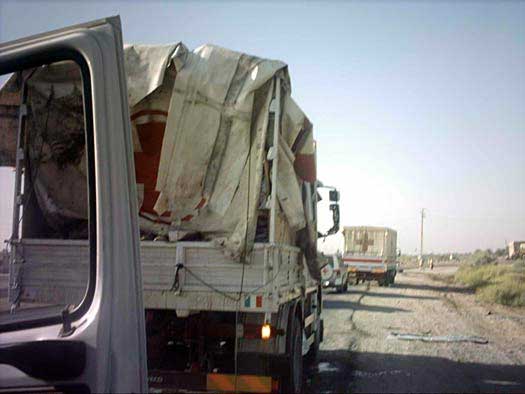 | | The Red Cross water lorry after the attack on the highway to Najaf. |
We did not know if we would be hit again. Augosto, our driver, wrestled with the vehicle as we seemed to be going all over the road. I honestly thought that we were about to crash or roll over. After what seemed like minutes, we straightened up and carried on our way. From the front, they asked if we were okay - we were, just my cheek was hurting, not because the glass had hit it (it had not), but I think from the pressure of the explosion, but it was not even bruised and calmed down after an hour or so. And later I noticed that my shoulders and arms were hurting, probably from pulling Wejdy, but that too cleared up. After a few kilometers we stopped on the side of the road. Checks were made on everyone.
Thankfully, only one was injured - Uday, one of the Iraqi volunteers was badly cut. His face had about 40 small shrapnel cuts, one close to his right eye and his right arm was badly cut up too. He was put in the back of our ambulance and treated. He looked shattered and he looked like he needed to cry - the shock for him was worse than for any of us. He had been in the water lorry in front of us and this had taken the full brunt of the attack, completely losing its windscreen and other windows and wing mirrors. The tarpaulin over the water had to be removed as it was ripped and tattered and dragging on the ground and causing a nuisance. While Uday was being treated, Wejdy and I sat in the front of the ambulance. The windscreen was smashed, but still in place.
I marveled at Augosto's composure and driving - he had controlled the ambulance after the explosion and kept it upright on the road. The same for the lorry driver in front - the lorry had taken the worst of the blast and the driver had continued to control the vehicle, despite losing all the glass, and his passenger being injured - and he was driving a lorry! Ali's car too had been damaged, losing the back windscreen and back side window. Had we crashed after the attack, the implications are too horrible to consider - we could have been stuck on the road and come under fire from whoever had attacked us - it is down to these wonderful drivers that this had not happened. I asked Ali who he thought had down this and he simply replied "f**kers". There was no more discussion on the way to Najaf and I, for one, just longed to get there and get off the dangerous highway.
Throughout and after the attack, I felt strange - not frightened, at no time did I feel scared - I just felt shattered and upset, maybe it was a bit of shock, I don't know, but it was an emotion I had never experienced before. When we arrived at Najaf, later on, we were able to ask what people thought had happened. Wejdy had seen the explosion saying that he had seen something hit the road to the side of us and the dirt and dust rise. The dirt had filled the ambulance, going everywhere - all over the medical equipment and filling our own packs with mud and glass - even though the window to the side of us had largely stayed intact some glass had come away and flown around the ambulance. Safa'a, one of the Iraqi Red Cross staff, had been in the car behind us. He doubted that it was a missile (RPG or mortar) and said he thought it was a roadside bomb. Possibly, he said, someone had followed us from Baghdad and overtaken us and laid the bomb, waiting somewhere nearby with a remote control or setting a timer for our arrival - but he felt that it was definitely directed at us and wondered and worried how we would return to Baghdad safely.
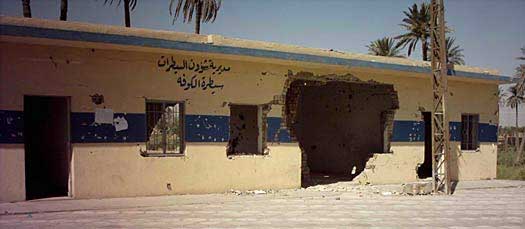 | | A building in Najaf, battered by the fighting. |
A couple of hours later we arrived in Najaf. There were signs of fighting everywhere - bullet holes and tank round holes adorned many buildings. We crossed the bridge over the beautiful Euphrates River and I remembered our earlier visit to this holiest of holy cities, back in December last year - how much calmer things were in this country then. We passed a Mahdi Army checkpoint and passersby were talking to Wejdy pointing out damage to buildings and telling us about American attacks on the city, how they could not sleep etc. Some said "God help Moqtada". We continued deeper into the city passing markets and shoppers here on the outskirts, almost carrying on as normal. But as we went on, the streets became quieter. Less and less people and cars were to be seen.
We were warned against going one way as there were American snipers there. We went a different way through a residential area. We went down narrow dusty uneven roads, each side of us sandy coloured houses came right up to the street. People came out to see us and hold up the low lying electrical cable so that the lorries could pass. We began to hear gunfire and the sounds of tank fire in the distance. As we carried on it became louder as we got nearer. Again many spoke to us, saying how many people had abandoned their houses through fear of their lives and gone elsewhere. Children came out and neighbours watched from their doorways, many waving and smiling at us - many telling us bad things about the Americans and asking why this was happening to their city. One man warned us that the Americans would not let us in.
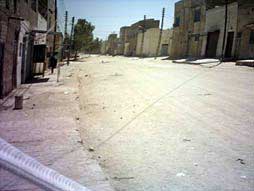 | | A deserted street in Najaf, 200m from the Imam Ali Mosque. | The streets then became eerily quiet. Quiet that is except for the sound of battle - machine gun fire and tank rounds filled the air. Two of our number ran ahead of the convoy, wearing Red Cross tunics (white with a big red cross on them) and waving a huge Red Cross flag. They went to each junction that we had to pass and showed themselves and the flag. As we passed each junction, we could see American tanks at the end of each street, about 150 metres away - at the end of one street, there were 3 tanks. We carried on slowly. Then we came to one junction - here the fighting sounded like it was on the street in front of us that crossed our street. The machine gun fire was deafening. Again, the two went with the flag to indicate that we were Red Cross carrying medical aid. But we were not allowed to pass. They went down the street towards the Americans, but no, we could not pass. They later told us that the Americans there would rather have vomited than speak to them! We waited a while, not passing the junction and the battle carried on - it seemed as though it was just in front of us. We parked up against the empty houses.
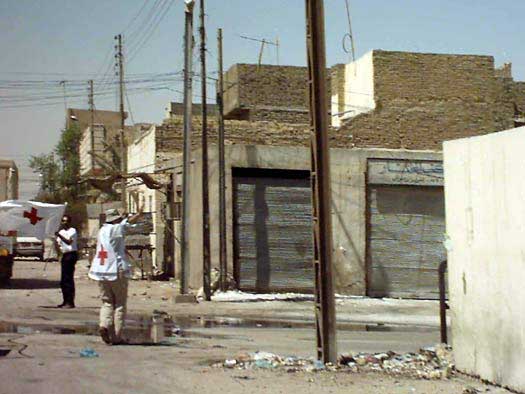 | | Checking each road junction. Red Cross officials wave flags at American positions so that we could pass safely. |
A family in a house nearby asked us into their home. We went into the visitors room - a large room with some seats and mattresses arranged around the walls, the windows, open, faced onto the street. We sat for a while in the heat - there was no electricity so the fans were not working - Najaf is without electricity and then we began to unload some medical equipment. The men from the Italian Red Cross began to set up a makeshift field hospital there in the sitting room. They set up 3 small beds and placed necessary medical items, gloves, disinfectant and so on, at the head of each bed. Drip stands, first aid equipment and boxes of medication were arranged around the room. Poor Uday came in looking like he was in great pain and he was given an injection to help take the pain away.
[continua nel prossimo post] |
[Modificato da cercatore01 07/09/2004 13.07] cercatore - amministratore del forum |
 07/09/2004 13:01 07/09/2004 13:01 |
|
| | | Post: 41 | Registrato il: 03/09/2004
| Utente Junior | | OFFLINE | |
|
<style type="text/css"></style> Iraq Diaries [parte 2]
Helen Williams, Electronic Iraq, 23 August 2004
[continua dal precedente post]
While all of this was going on, the fighting continued outside - it seemed to be getting closer and the tank rounds from the Americans sounded like they were hitting the next building. One in particular sounded very close, shaking the house even stronger than the others, the glass light fittings rattled and my toes curled. One of the Iraqi Red Cross guys told me that when they had come to Najaf a few days ago, they had been allowed to pass the American line and deliver the aid and do something worthwhile, but here we could do nothing. A few days ago, the Americans had been further away from the Imam Ali Mosque, but now they, and us, were within 200 metres - it seemed as if they thought they were going in for the kill and they did not want any of the injured to be saved. As we were not allowed to pass the lines we could not treat any of the injured, and they could not pass through the lines and get to us. The situation was unbelievable and impossible. The Americans should have let us through, we were aid workers.
There is no way they should have stopped us. It just shows their flagrant disregard for human rights and human life. They are disgusting, evil murderers and I saw it for myself, all we wanted to do was deliver aid to injured people. The decision was made to pack up and head out to Kufa, where there was also (unreported) fighting, some 10 kilometers away - there we would be able to do something worthwhile, it was hoped. So we packed up all the equipment and headed back out along the dusty streets. The residents that remained came out to see us go, asking why we were leaving. They also could not believe that we were unable to pass. They were telling us things about the people leaving the city. One said "Is this democracy?" Another "God help Moqtada" and others told how the Americans had been firing at their houses.
We took back roads out of Najaf, so bumpy that the ambulance bottomed out several times and made our way to Kufa. We passed more Mahdi Army checkpoints, who let us pass unhindered and approached the Mosque.
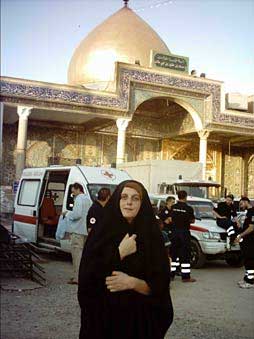 | | Helen stands with a chador in the compound of the Muslim Mosque (adjoining the Moqtar Mosque) in Kufa. Italian Red Cross vehicles and volunteers can be seen in the background. | Here Ali talked to the men guarding the site and they pointed the route we should take to the mosque gates. We entered the mosque. This was a 'double' mosque - two mosques in one complex - Moqtar Mosque and Muslim Mosque. Mahdi army men were sitting in the shade around the Mosque eating their lunch. One small girl near the mosque stared at us in disbelief - I smiled at her and her little face broke into a wide grin - I wondered at the things she had seen and what her life was like. Inside the mosque, all the vehicles parked up in the mosque compound. The Mosque was being worked on and made beautiful, there were building materials everywhere and men working.
We were taken to a small room in one of the buildings around the courtyard and given lots of cold water to drink. I had put my headscarf on as soon as we reached the outskirts of Najaf. Now I had my chador on as well - here in the mosque, it was important that not one strand of hair was on display.
Safa'a then took me and Wejdy to another small room across the courtyard. In this room were about 10 small beds with 5 patients - young men who had recently been injured. One man had a colostomy 5 years ago, but it had started to bleed and he was unable to reach a hospital so he had come to the mosque for rudimentary treatment. Two other men had been burnt badly after an American missile attack - the one had both legs badly burnt and one arm, the bandages on which needed changing, blood and fluid was seeping through. Safa'a told him to try and move his injured limbs to keep them mobile. The other 2 had also been injured by a missile attack. One, who said he was 18, but looked 15 or 16, had shrapnel wounds all over his back and buttocks, so he could not even lie down comfortably. Fortunately, especially for the burns victims, there was electricity here - at least they had the benefit of air conditioning and fans, if nothing else.
We left the room and were taken into the Mosque itself. It was the first time that I have ever been allowed into a Mosque in Iraq. Unlike Syria, Tunisia and Turkey, non-Muslims are not allowed into mosques in Iraq - but they made an exception for us and I felt so lucky and honoured as I entered the recently refurbished prayer hall. It was absolutely stunning with huge beige and white pillars and beautiful white glass lights hanging between each and of course, lots of fans. The prayer hall was open to the mosque courtyard with huge brick arches and the hall itself was large, peaceful and airy. The Mosque is called Moqtar Mosque. Moqtar is the man who killed Yezid, an Ummayad in Damascus. Yezid is the man who killed Hussein in Kerbala in 680 AD. Hussein is the man who is revered in the month of Moharram and 10 Moharram (Ashura) is the day on which Hussein died at Kerbala - this is the day that the bombs happened at Kerbala and Khadimaya this year - the most special and holy day for Shia Islam. Moqtar is buried in this Mosque. In addition to this, this mosque is the first mosque that Imam Ali, son-in-law and cousin to the Prophet Mohammed, ever preached at and it is the mosque that Moqtada Al Sadr, the man himself, leads prayers every Friday - the one you see on TV. So it is a very very special place, almost, but not, as special as the Imam Ali Mosque in Najaf, where Imam Ali is actually buried.
Here in a small room off the side of the prayer hall we sat down for lunch. Wejdy experienced for the first time a pleasant vegan phenomenon. Everyone else was fed first - they had horrible kebab meat on some flat bread with onions and tomatoes. We waited patiently for our food to arrive - Ali had kindly explained that we were vegan. And then it came - a huge plate - over 40 cm in diameter - of yellow rice with baked vegetables on it - eggplant, tomatoes, potatoes, onions etc - it looked delicious and everyone else thought so too, looking eagerly at our food. And once again, I enjoyed that feeling - the feeling that everyone else in the room had wished they had said they were vegan too.
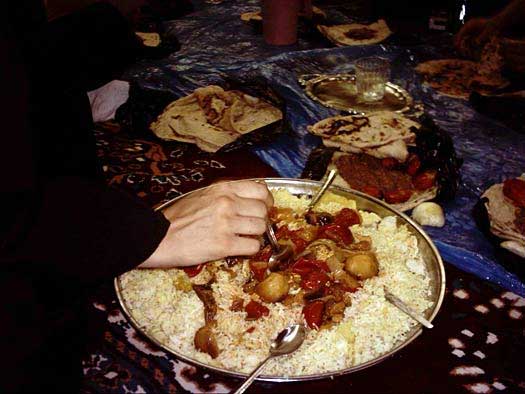 | | Our lunch in Moqtar Mosque, Kufa - compare to the meaty dish next to it! | Throughout the meal, different men came and joined us in the room. Many of them were fighters and they were all thoroughly pleasant men. Being the only woman in the party, I was completely spoilt, my chai glass constantly filled. But when I spoke a few words of Arabic saying how much I loved Iraq, chai, that was it. Talking and laughter filled the room as we discussed Wales (and its 'occupation' by England), the situation in Iraq, the evil of America and even what sports I liked.
Poor Wejdy could barely keep up with the translating and he encouraged me to say more and more in Arabic, but by now my head was pounding - probably from a combination of the 2 hours' sleep I had last night and the bomb blast on the journey south. I was happy when we were informed that we would take two hours rest until 6 pm, when we would open up a clinic for the evening - I was to help any women that arrived. But before we went to sleep, a couple of fighters wanted to speak to the Italian Red Cross men. One of them wanted to know why, every time he launched a rocket, his body shook, his eyes went blurry, his ears went strange and he became dizzy. The doctor told him it was probably from the force of the launch. But the man was still concerned, saying that it did not happen to his compatriots - he was told that it was probably due to his health, different men can do different things and he probably was not 100% fit from all the worry and fighting and that it was nothing to be concerned about if he felt otherwise healthy in his normal day to day life. Abu Moqtada ('father of Moqtada' - he had recently had a newborn son who he had named after Moqtada Al Sadr), another fighter, had crude stitches holding together cuts on his fingers - this was then dressed very tidily, but he was still able to fight as his right hand was unaffected.
When we awoke at 6pm, we were given more chai. I was also given a photo poster of Moqtada - it was an old battered one and the men wanted to give me a new one. I declined their kind offer, preferring the old one that had actually been used and put on display in the mosque. We had earlier met two of the mosque sheikhs and now we talked to one of them for a time before going outside and helping to unload the lorries of medical aid. Two ambulances were filled with emergency equipment for Najaf and other things were unloaded into a makeshift clinic in a room within the mosque compound. Then the lorry of water was unloaded onto the courtyard of the mosque.
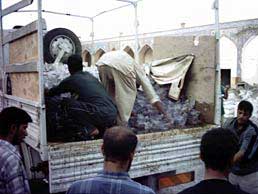 | | Delivering water in the mosque. | 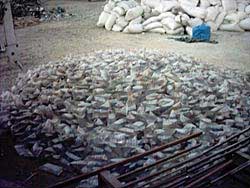 | | Pile of water bags in the mosque. |
Nagi, a little 9 year old boy was helping here. I had met him earlier and he was a real sweetie. Orphaned, he lived in the mosque and he was everywhere all the time, the centre of attention and spoilt and fussed over by all. I was told that he loved to help the fighters load their guns with bullets and he wanted to fight and die alongside the men. He wore a headband which said "Please God, let Mohammed's law be obeyed always" in Arabic. He worked so hard all day and night and when we went to sleep, later on, in the prayer hall, he was there again, sleeping next to us.
[continua nel prossimo post] |
[Modificato da cercatore01 07/09/2004 13.06] cercatore - amministratore del forum |
 07/09/2004 13:05 07/09/2004 13:05 |
|
| | | Post: 42 | Registrato il: 03/09/2004
| Utente Junior | | OFFLINE | |
|
<style type="text/css"></style> Iraq Diaries [parte 3]
Helen Williams, Electronic Iraq, 23 August 2004
[continua dal precedente post]
Throughout the evening we talked to so many fighters it is difficult to remember them all. I can honestly say that they were all amazingly brave kind and decent men. They are not terrorists or religious fundamentalists. They all knew that I was British and that the Italians were Italian and all had the capacity to realise that, just because we were from bad countries occupying and stripping Iraq, it did not mean that we agreed with our governments. On the contrary, we explained that we did not. And not being Muslim was not a problem either - there was complete and utter respect for each others' religions.
They just want America out of Iraq, away from Kufa and Najaf and away from their holy shrines. Many of them did see it as an attack on Islam, but readily listened to me when I explained that it was more than just that. But I could not answer when they asked me why I thought the Americans were attacking the mosques - in the end I just answered that I could not understand the hatred in any man's heart that would attack poor people in residential areas with no regard for the sanctity of human life, so I certainly could not answer for these evildoers.
Another local man wanted to take us all to his house and put us up for the night - he asked why did America attack Iraq and try and bring their Western 'values' which Iraq does not want? He said "You're Christian, become Muslim, if you don't should I kill you? Of course not! So why can't America just let us be and respect our religion?"
Another fighter told me how his mother was also fighting - she fires off RPGs at the Americans, in her chador, even covering her face up to her nose.
We also met other fighters who had traveled there from all over Iraq - from Hilla, Amara, Kerbala etc.
Then as we crossed the courtyard one time, Wejdy suddenly spotted an old school friend, in fact one of his best friends - Mohammed from Hilla. They could not believe it, meeting each other under such circumstances after one and a half years. Mohammed had come to fight America and Wejdy had come to help with medical aid and vital translation.
During the evening, a speech was read out over the mosque loudspeaker - then all the men stopped and started chanting ending with "Moqtada, Moqtada, Moqtada". They had just been told that America had launched a big attack on the centre of Najaf, but the Mahdi Army there had fought back with RPGs and they had repelled the attack - the Americans had pulled back - I just hoped it was true, and that as a result no further blood had been spilt.
There were no weapons stored in the mosque. The only time I saw weapons was when the fighters would come into the courtyard to rest or get water etc. They were not launching any attacks from the mosque itself. I saw all sorts of weapons - sniper rifles, AK47's, RPGs. I joked that I was so angry with American soldiers' attitude that I could have launched one at them myself. Well, that was it. They had an idea that I should go outside and hold an RPG and have my photo taken. This had to be done outside of the mosque as an RPG could not be held in attack position (even for a joke) in the mosque compound. At first, Ali, who was in charge of our group, wouldn't hear of my going outside in case there should be an attack - I was certainly safer inside the mosque compound. But then the Mahdi Army guys persuaded him that it would only be for 5 minutes and we were allowed.
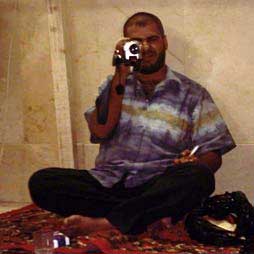 | | Mosque video man - filming us photographing him! | Outside, amongst even more fighters, I held, first of all, an Iraqi RPG. As I posed (not easy in a chador) with this weapon, it became heavy and I was glad when the photos and film was done. Then I held an American RPG, but this one was easy and much lighter - I told the fighters this - that the Americans always get it easy - even their weapons were lighter. One of the men from the mosque filmed me - he had filmed us all day and Wejdy joked that he bet he would show the film to Moqtada.
So during the evening the Italians opened up a makeshift clinic and a long queues quickly formed across the mosque courtyard. Some of the Italians went and treated the badly injured men. Every time a woman turned up, it was my job, with Wejdy translating, to find out what their problem was. Then we would go and tell Safa'a in the clinic and try and get the women treated, ie jump the queue, as soon as possible. One lady, Azhar, with her mum, Om Khalid, was suffering from kidney stones. I spoke to one of the Italian doctors who told me there was nothing to be done for her here, but that she could go to the Italian Hospital in Medical City in Baghdad and receive treatment there free of charge. I spoke to the ladies, in Arabic, and they told me how they could not sleep with the American attacks on Kufa.
Two other women turned up with their lovely children. Two of the children were suffering with fever and sickness. One lady had Sadiq and a new born who she had called Moqtada and the other lady was holding her little daughter, Zahra'a, with two other children, Hussein and Ali. Moqtada and Zahra'a - the two youngest, were ill and they were given medicine which they had to mix with water (which is dirty) and take twice a day. Then a whole family turned up needing treatment. Every time I saw a woman in the courtyard, looking lost and requiring treatment, I had to leave anyone we were talking to go and help. This family had a whole host of problems. The little girl, Zeinab, 9 had kidney stones. The Italian doctor told her to come to Medical City in 6 months for an ultrasound scan - they would only be a problem if they moved or became bigger - in the meantime she was to drink lots and lots - the family had brought her x-rays for him to check. Om Zeinab (Zeinab's mum) was suffering from stomach acid and she was given magnesium powders to take twice a day and she also had a bad, painful shoulder for which she was given some packets of paracetamol. Then her mum had colon problems and she was told, like others, to get to the Italian Hospital in Medical City for treatment - she could not be treated here.
Another woman brought her little son with gastroenteritis - he was also given medicine.
There were others, but one of the saddest was a little old lady who lived in the mosque. I pushed her in the queue - she was suffering with a prolapsed womb and when the doctor touched her abdomen she shrieked in pain. There was nothing to be done for her, he said, just painkillers. Even if they operated, it was likely to happen again. She was a dear, sweet lady and kept thanking me - I felt awful, I had done nothing. I saw her the next morning in the mosque ladies' bathroom - she kept talking to me in Arabic, but all I could really understand was "thank you" and "goodbye".
Throughout the evening the queue did not subside and the Red Cross men looked shattered and coped so well in the conditions. They were asked if they needed to rest, but they declined, not wanting to leave people standing in a queue while they took a break.
We finished at about 11.30 pm and took rest in the room where we had eaten lunch. We drank water and ate some food and then, thankfully, it was time to sleep. Fighting had broken out some time earlier and, though it was nowhere as near to us as it had been in Najaf, it was still close. We heard loud booms from American tank fire and reply fire from the streets around the mosque.
I felt drained and shattered and felt like I wanted to be a real girl and have a good cry. Not for myself, but for what was going on around me. It all seemed so unfair, so wrong and I felt powerless to do anything to try and put it right - I feel writing about it in this way goes some way to address this, trying to tell the truth about what I witnessed and trying to tell as many people as possible.
We found a carpet and lay down for sleep in the prayer hall. At first I was boiling hot in my chador and headscarf and I thought I could not sleep with the sound of the fighting outside. But I did, I was so tired, though the call to prayer at about 4.15 am woke me up for a time, but I didn't mind as I find the call to prayer a beautiful, relaxing sound - and being in a mosque while it happened made it seem just extra special.
At 6.30 am we were woken up - we were leaving. Time for a quick wash before we hit the road - the thinking being that we would beat any would be attackers on the way back to Baghdad. We left the mosque, waving goodbye to our new friends and drove through Kufa, the town was just waking up and some market stalls were just being set up for the day. Then outside of Kufa we drove past some lush green fields for a time before passing three brick factories. They did not look as bad as those a Al Nahrwan - but I saw the living quarters - squalid tiny brick houses arranged around the factories and chimneys and the only difference seemed to be that there were only three of them here as opposed to 100 -150, so therefore the air could not be quite so poisonous.
We drove on and reached Hilla and here for the first time, I felt afraid and worried. It was not long before we would pass Al Lattifya - would we come under attack again - I was dreading it. There were many checkpoints along the way, including a particularly big one at Hilla, with a big traffic jam.
Then it happened - just 5 kilometers before the spot we were attacked in the day before, we came under attack again. This time I saw it. A huge explosion in front of us threw up loads of dirt and debris and the road disappeared in a cloud of smoke. We drove on quickly. There was no way we could stop, we had to keep going. To stop would have surely meant that we would have been killed. A white car passed us, the driver, a man in a red yashmak, was holding his blood-soaked head as he drove on - his car was wrecked, but he kept going - you must not stop. A kilometer or so up the road, there was an ICDC (Iraqi Civil Defence Corps) checkpoint. We were stopped and Wejdy told them what happened. Do you know what these cowards said? "What do you want us to do about it?" Well for one, set up a patrol down the road to stop this happening. They are supposed to defend the civilians of Iraq and here they are a kilometer up the road from where civilians are being attacked and they are doing nothing about it. We did not stop until we got to Baghdad. Safa'a walked down the convoy checking us all. I asked where Ali's car was, where had Ali gone. "I don't know" he replied "I just don't know - we will have to find out where he is when we get to Medical City".
We still don't know where Ali or his car is. He was in the first vehicle which was hit by the roadside device. But when we passed the site - some 50 metres in front of us when it went off - we saw no debris from a wrecked and broken car. No one seems to know where he is and his mobile phone, always, always on, is off or 'out of range'. We are sick with worry and it has been hard typing this today with this on our mind - I will let you know what we find out. He is a good man, and always tries to help everyone. It does not matter who they are - he took us to Fallujah and it is because he kept us safe there that I trusted him with our safety to go to Najaf. I am just hoping and praying that he is okay and that it is just his phone that is not working.
The Mahdi Army are not terrorists or madmen. Each and every single one of them was disgusted to see the damage to our vehicles and hear about what happened to us, saying that it was wrong, so wrong. The terrorists are the men on the highway trying to blow up Red Cross vehicles and kill good people trying to help others. It has been suggested by many, and sensible people at that, that the attacks could have come from American troops - after all, they did not want us to go in and help the wounded in Najaf, so why not try to stop us from getting there in the first place?
I feel so certain that what America is doing in Iraq right now is wrong - it is a criminal act. I am as sure about this as I am that meat-eating, vivisection and the war in the first place was wrong. America should get out of this country and get out now, they have wrecked it - the problem is that they have opened up a sore that cannot heal. If the people were suffering before, their suffering is so much worse now. I look at Iraq and I see a broken, battered country with nothing in place to make life in any way easy. Buildings and infrastructure were badly wrecked (from sanctions mainly) before the war, and I wonder at the minds of men who could bomb and attack such a place and kill and hurt so many innocent people. I hear story after story of suffering and injustice and it is making me sick and tired.
As I type this, I want to cry, I am literally fighting back the tears. I don't know if I am just tired from the last two days, if it is worry about Ali or if I have just had enough of seeing suffering. I do know that I feel emotionally drained - in a way I had the most amazing experience of my life with the gentle men of the Mahdi Army, but in another way, I wish it hadn't happened - that none of this was happening and I only wish it would stop soon and that they will prevail. I cannot be unbiased about this, I am sorry - it is just impossible.
(Today we have been to visit 'Jamal' - I have talked about him many times before - he looked after the boys in the temporary accommodation shelter. His brother 'Ali' is fighting in the Mahdi Army in Najaf, alongside another brother. Happily 'Jamal' has heard off 'Ali' and he is alive and well. And the other brother arrived in Baghdad yesterday, safe and sound. Thank goodness - 'Ali' is such a nice man, I could not bear anything to happen to him.)
Helen Williams lives in Baghdad. She is from Newport, South Wales.
Page last updated: 23 August 2004, 17:09
|
[Modificato da cercatore01 07/09/2004 13.06] cercatore - amministratore del forum |
|
|
|
|